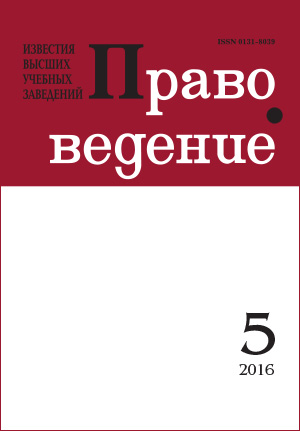Psychological theory of law by Leo Petraźycki in the light of the communicative approach
Abstract
This article discusses the advantages and disadvantages of Leo Petraźycki’s psychological theory of law. The scientist founded the Petersburg school of philosophy of law which was presented by such outstanding scientists as P. Sorokin, G. Gurvich, N. Timashev et al. They developed the ideas of the psychological theory of law in the phenomenological and sociological direction. Petraźycki managed to identify and justify the necessary connection between the law and a human personality. The law in such a post-classical perspective is presented not as a reality external to a person and independent on him, but rather as a “humanized” reality. The law is created (constructed) and perceived by a person because of the specific capabilities of the human mind. The scientist was convinced that only a psychic reality understood as a reality of imperative and attributive emotions (feelings) matches with the law. The paper argues the inadequacy of such understanding. At the same time, the idea of Petraźycki about the imperative and attributive nature of the law directly leads to the idea of communication as its (law) defining feature. L. Petraźycki not only actually recognizes the possibility of a common understanding, but also interprets the behavior of another person as a text admitting that the text has a general, that is “objective” (in fact, intersubjective) meaning. But this is only possible if the subjective semantic context corresponds to the objective semantic context, i.e. if there is a general meaning of the text and interaction resulting from it. Thus, normativity is a communicative condition for the existence of the law.
Keywords:
psychological theory of law, communicative approach, Petersburg school of the philosophy of law, imperative and attributive emotions, intersubjectivity, general meaning
Downloads
References
Downloads
Published
How to Cite
Issue
Section
License
Articles of "Pravovedenie" are open access distributed under the terms of the License Agreement with Saint Petersburg State University, which permits to the authors unrestricted distribution and self-archiving free of charge.




